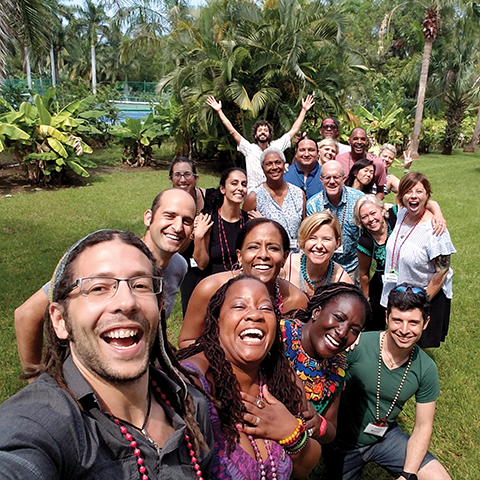
The Opportunity Collaboration (OC) summit was launched in part because Jonathan C. Lewis, a social entrepreneur, was sick of traditional conferences.
“He even had what he called a ‘Bug List,’” said Topher Wilkins, who worked closely with Lewis early on and is now CEO of the annual meeting. “It was all the things that frustrated him about standard conferences: rubber-chicken dinners, plenaries, keynotes, and death by PowerPoints.”
Ultimately, Wilkins added, Lewis realized that “it was the 15-minute coffee breaks between sessions where he actually got to tap into the human capital that was available.”
So in 2009, when Lewis launched a summit to address global poverty, he modeled it on the freewheeling exchanges that emerge during a coffee break. Now heading into its tenth meeting — and run by Wilkins and his wife, Jorian — the event is held at various all-inclusive properties in Mexico and fills to capacity every year. In fact, it’s been such a success that OC introduced a second, U.S. version of the summit this year, which drew 250 delegates to Port St. Lucie, Florida, from May 6-11.
With its diverse range of attendees — everyone from investors to academics to artists — Opportunity Collaboration has produced new partnerships and continues to dedicate each of its meetings to producing real, sustainable solutions to poverty and social injustice. And it still strives to be as “un-conference” as it can.
Diving Deep
Morning sessions set the tone for each day of Opportunity Collaboration. Attendees break into small groups and, with a little prodding from a moderator, quickly dive deep. They talk about everything from what motivates them to their emotional triggers to their first experiences with poverty or inequality. “We really get people to be vulnerable,” Wilkins said. “Tears can be shed. Strong words can be shared. We invite people to be really raw and real with each other. And that’s the cornerstone for every day.”
The blend of personal-but-weighty continues during concurrent sessions scheduled throughout the rest of the day. The wide-ranging topics covered at the most recent summit included innovative philanthropy, inclusion strategies, and the struggles indigenous people face in the U.S. “These sessions are all conversations — literally a circle of chairs in the room,” Wilkins said. “Hosts are expected to ask a lot of questions and facilitate a conversation.”
Wilkins also carves out time between sessions for people to meet, continue chatting, or even go out sailing — at least a few wide-open hours are built into the schedule every day.
‘Unlikely Allies’
To fully immerse attendees in the Opportunity Collaboration experience, the summit takes over an entire property, and has since the first year it was held.
Wilkins said that Lewis chose Mexico because he wanted to have a global summit that wasn’t set in the United States, as so many are. But since many of OC’s attendees do come from the U.S., Wilkins said there’s the added benefit of pulling them outside their comfort zones.
Situating the entire conference at a single hotel also lets attendees “go deep and cultivate relationships since they’re constantly interacting in this compound that we have all to ourselves,” Wilkins said. “It’s really conducive to making sure that the depth and breadth of relationships are maximized.”
Last year, Opportunity Collaboration drew 400 attendees and 100 “traveling companions” — spouses and children, mostly — to its Mexico summit, held in Ixtapa from Oct. 15–20. They came from all areas: philanthropists, foundations, angel investors and wealth advisors; people who work in media, in academia, in incubators and accelerators; authors, artists, and musicians.
“We’re keen on the fact that it’s often the most unlikely allies,” Wilkins said, “who form the most effective partnerships and collaborations.”
Serious Outcomes
“The last thing we want to see is a big kumbaya session and then nothing happens as a result,” Wilkins said. “We convene to make sure that we’re moving the needle on solutions to poverty, and that stuff is getting done as a result of bringing these amazing people together.”
Since Opportunity Collaboration began, Wilkins has seen social entrepreneurs connect with impact investors and he’s watched programmatic partnerships form — including a clean water initiative in Brazil that linked up with a low-cost affordable school model also from Brazil, ensuring that those schools have clean water.
He has also seen funders pool their resources and invest collectively, and he’s watched as individual organizations meet and then merge into a single entity — “the ultimate form of collaboration,” he said.
And there are the less-tangible results, too: Leaders who arrive on the verge of burnout and leave rejuvenated; attendees who go from feeling isolated to finding a robust community they can lean on.
As a direct result of attending OC, “people join boards, people get hired,” Wilkins said. “They’ve even gotten married and had babies because of it.”
Seizing Opportunities
How does a summit focused on eradicating poverty and social injustice create a formal CSR program so participants can roll up their sleeves to improve the local communities in which they meet?
Opportunity Collaboration approaches CSR with the same “un-conference” mentality as the rest of the summit program. “We do our own little bit of CSR work, if you will,” said Opportunity Collaboration’s Topher Wilkins, “to the extent that every year in Mexico we make sure that folks who want to have a chance to go into the local community and link up with leaders doing work on the ground — nonprofit folks who are running orphanages or entrepreneurs who are working on the Yucatan Peninsula. We make sure that our delegates have a chance to form partnerships and collaborations with the local people in the various parts of Mexico where we convene.”
Wilkins said they will be looking to see if it makes sense to create similar opportunities at the U.S. version of the event in Florida.
Learn more about The Opportunity Collaboration summit at https://www.ocimpact.com/.



